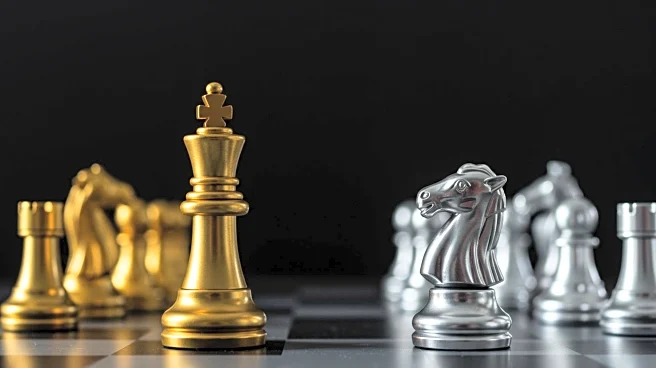What's Happening?
President Trump recently hosted Russian President Vladimir Putin at the Elmendorf-Richardson military base in Anchorage, Alaska. This meeting marked the first encounter between a Russian and American president since the invasion of Ukraine. Despite the lack of any significant announcements following their discussions, the event was notable for transforming Putin's image from a Western pariah to an honored guest on American soil. The meeting was characterized by a warm reception, with Putin being greeted with applause upon his arrival. This development highlights a significant shift in diplomatic relations between the two nations, as the meeting took place amidst ongoing geopolitical tensions.
Why It's Important?
The meeting between President Trump and Vladimir Putin is significant as it signals a potential shift in U.S.-Russia relations. By hosting Putin, President Trump may be attempting to open new diplomatic channels or reduce tensions between the two countries. This could have wide-ranging implications for international politics, particularly in relation to the ongoing conflict in Ukraine and broader geopolitical dynamics. The meeting may also impact U.S. domestic politics, as it could influence public perception of President Trump's foreign policy approach. Critics may view the meeting as a controversial move, while supporters might see it as a strategic effort to engage with Russia.
What's Next?
Following this meeting, it is likely that both nations will continue to explore diplomatic engagements. The reception of Putin in the U.S. could lead to further discussions on contentious issues such as the situation in Ukraine, cybersecurity threats, and arms control. Observers will be watching closely to see if this meeting leads to any tangible policy changes or agreements. Additionally, reactions from other Western nations and NATO allies will be critical, as they assess the implications of this renewed engagement between the U.S. and Russia.
Beyond the Headlines
This meeting may also have deeper implications for global power dynamics. By engaging with Putin, President Trump could be signaling a willingness to challenge traditional Western alliances and norms. This could lead to a reevaluation of the U.S.'s role in international affairs and its relationships with other major powers. Furthermore, the meeting raises questions about the ethical considerations of engaging with leaders who have been criticized for their actions on the global stage.









